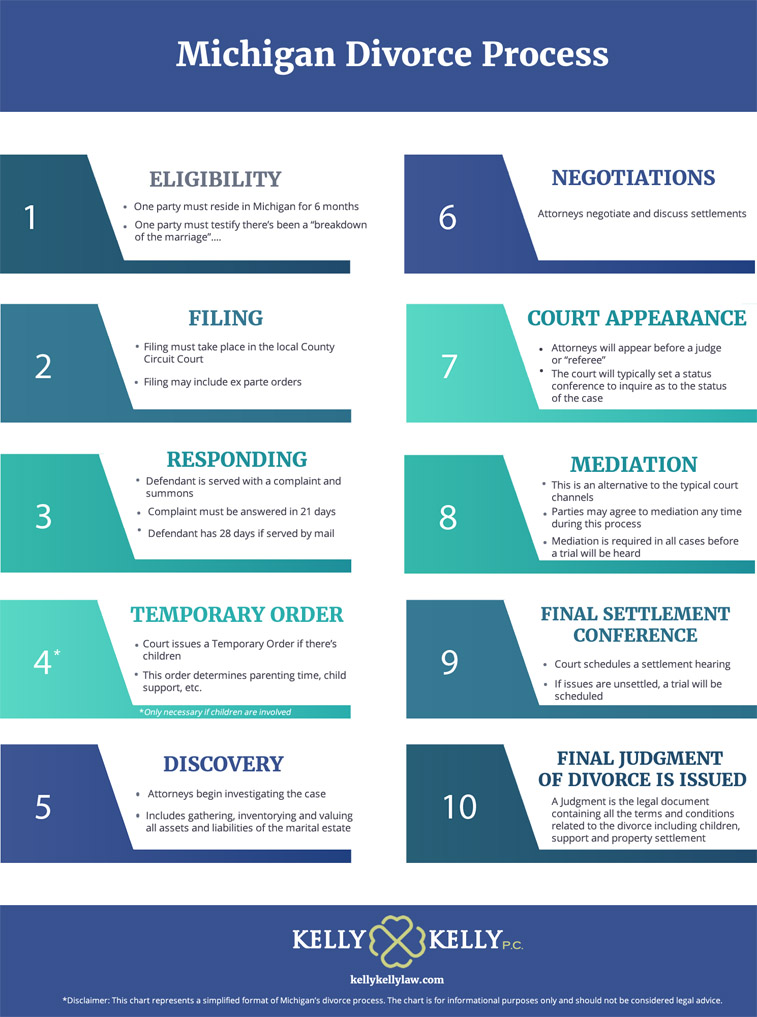Michigan Family Lawyer
Legal issues involving family law are often the most difficult, emotional, and stressful times in a person’s life. During these times, it’s difficult to maintain clear and rational thinking especially when children are involved. In these times, it’s critical to have your rights and interests protected by an experienced family lawyer who understands the legal process within your state.
Kelly & Kelly P.C. has over 30 years representing clients in legal matters such as: filing for divorce, contested divorces, child custody, and issues involving domestic violence/abuse.
If you, or someone you know have legal issues involving family law or divorce in Michigan, call our experienced attorneys for a confidential consultation today. (248) 348-0496
Page Navigation
The family law attorneys at Kelly & Kelly know the Michigan legal system inside and out and have decades of experience in many family courts throughout the state. We handle all aspects of family law from representing clients in divorces, custody battles, paternity suits. This includes high conflict cases involving narcissists, substance abuse, severe fault, dissipation of assets and special needs children.
We are dedicated to providing our clients with the best representation and advocacy possible for many areas of family law. This includes areas such as:
- Filing For Divorce
- Child Custody Disputes
- Contested Divorces
- High Conflict Divorces
- Paternity Issues
- Parenting Time
- Spousal Support
- Post Judgement Issues
- Property Division
- Division of Retirement Accounts
Ryan Kelly is an award winning lawyer in family law and the head of the firm’s family law department. She’s also a member of the ICLE Family Law Advisory Board and has made several legal contributions to the ICLE in the areas of divorce, custody, parenting time, etc. Ryan’s individual awards and achievements include:
- 5 Star Rating on Avvo
- Michigan Rising Star Super Lawyers
- Top Lawyer in Michigan by Detroit Business Magazine
- Michigan Top Lawyer in Family Law 2015
- Top 10 Under 40 in Family Law (National Academy of Family Law Attorneys)
Michele Kelly is a senior partner in the firm and has practiced family law for nearly 30 years. She has appeared in courts throughout the State of Michigan and the States of Iowa and California. Her wealth of experience is often relied upon in evaluating a client’s case and their strategy for resolution.
Michigan is a “no-fault” divorce state. In other words, you don’t have to prove anything in order to file for a divorce. With that said, there are several requirements to legally file for a divorce in Michigan, these include:
1. You or your spouse must have lived in the State of Michigan for at least 6 months prior to filing
2. The filing must take place in the local county circuit court where you or your spouse reside
3. At least one party must testify that there has been a “breakdown of the marriage” per Michigan Divorce Statute 552.6
After you file for divorce, your spouse will need to be served with the Summons and Complaint, and any additional documents filed with the court at the time of the initial filing. This is also known as being “served.” Service can be accomplished in a few different ways depending on your spouse’s level of cooperation, and whether or not he or she has retained counsel.
Our experienced lawyers handle divorce filings all over Michigan and are well-equipped to assist you with both the filing and represent you in the event any issues arise.
Here’s a simplified chart that outlines the stages of a Michigan Divorce. You can click the image below to enlarge.
In Michigan, the standard of determining child custody is known as the best interest of the child. In order to determine child custody, a judge will examine the facts and circumstances of a case and make a decision based on these findings.
Parenting time involves the amount of time a parent can spend with a child after a divorce. This amount of time can vary based on many circumstances and cause a great deal of controversy and disagreements between parties.
Our lawyers understand the process involved with determining child custody as well as parenting time laws in the State of Michigan. We are experienced in advocating for clients in custody hearings.
In the State of Michigan, paternity is governed by the Michigan Paternity Act. If it is determined that a party is the genetic parent of a child, an order of filiation will be entered. This means that the genetic parent will now be responsible for paying child support.
Payment of child support may include:
- Medical expenses
- Expenses for the birth of the child
- Health care insurance
- Child care expenses
- Education expenses
We represent clients in cases involving the enforcement of child support and handling any legal disputes involved.
We’ve prepared a list of resources to help individuals with issues relating to family law and divorces. These resources help provide guidance to general questions on the topic.
- Michigan Friend Of The Court Directory
- Family Law FAQ
- Divorce Checklist
- How Assets Are Divided in Divorce
- Grounds For Divorce
- Self-Help Tools
Michigan Family Law Discovery Process
In Michigan family law cases, fact gathering is known as the discovery process. There are numerous methods in Michigan for either party to obtain information and facts about the case from the opposing party of third parties. There are two different ways to obtain discovery; the formal process and the informal process. The discovery process in Michigan should be aimed at gathering as much information as needed to either settle the case or proceed to trial.
The Michigan domestic relations discovery process can be used to obtain information relevant to spousal support, including incomes, work history, value of closely held businesses and education background. The process can also be used to gather more information that can be useful in child custody and parenting time, and how child support is to be calculated in Michigan. Discovery methods are also useful in identifying the nature and value of real and personal property, and making determinations and persuasive arguments in relation to the status of separate property or marital property. Knowledge about retirement and investment accounts in Michigan family law cases may not always be equally shared during the marriage, and the discovery process during a Michigan divorce is an opportunity to get a full accounting of the available assets. Your Michigan family lawyer has many different ways to gather the necessary information for your case.
Each client has a plethora of valuable information to share with their Michigan divorce or custody lawyer. A client may not have the full accounting of certain accounts or every piece of information about their spouse’s employment, but it’s an excellent starting point for the attorney to conduct additional discovery requests. The internet has become an excellent source for gathering more information about opposing spouses, determining property values, and identifying wages and incomes in certain industries.
In some Michigan divorce or custody cases, the parties are willing to freely exchange necessary information, and take away from the time consuming formal discovery process.
If the parties need to use formal discovery methods, your Michigan family lawyer may use physical and mental health examinations, requests for certain admissions of fact, deposition by written examination, serving subpoenas on the opposing party and third parties, requests to produce documents and records and interrogatories.
Each of these methods can be quite effective when trying to obtain certain information about the parties. The opposing attorney will have the same opportunity to use these methods to gather information for their side, so sometimes parties conclude that working in a cooperative manner is the easier route for both parties.
Settling Out of Court
There are several ways to settle issues related to divorce and family law outside a traditional trial. These methods often save each party a great deal of time, money, and stress. You can read more about these alternatives below.
Alternative Dispute Resolution – This involves settling disputes over divorces or other family court issues outside the courtroom. For example, in Oakland County, this method can be used for disputed issues such as spousal support, child support, property division, parenting time , custody, and a number of other disputes. Mediation can be ordered by the Oakland County family court or mutual agreement of the parties or written motion of a single party. A party may object to mediation, which a judge will then grant a hearing and decide if the matter will go to mediation. The mediator in Michigan can be selected by the parties or appointed by the court.
Collaborative Law – This is a new area of Michigan family law for family cases, and it involves both parties retaining their own Michigan family attorney, whose only job is to help resolve the case. There are two attorneys, and two clients working together toward an agreement without the use of the typical court proceedings. The lawyers are hired only to resolve the case, and reach a fair agreement, and these lawyers agree not to represent the client if the case goes to court.
The discovery process is less formal, and the parties agree to act in good faith and cooperate with each other. If the parties cannot reach an agreement, or one party wishes to go to court, the attorneys are then not allowed to follow the case to court, and the parties must hire new lawyers.
Family Law Arbitration – In Michigan family law arbitration matters are handled by a neutral third-party who acts as a judge and will rule on issues presented to the arbitrator. The arbitration decision is binding on the parties, subject to limited review of the court. Arbitration in Michigan can be used for actions of divorce, maintenance, annulments, child support, child custody, parenting time and any post-judgment proceedings.
It’s important to note, parties cannot submit cases that involve child abuse or neglect issues along with cases with allegations of domestic violence.
The arbitration process in Michigan can be a lot more informal and relaxed compared to the courtroom. The parties’ can select who the arbitrator is, and the issues to be decided. An arbitration award for child support, parenting time or the amount of child support is subject to review by the court and the standard to be used is “best interests of the child”.








